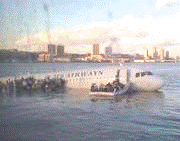Bird Strike Committee Proceedings

Bird Strike Committee-USA/Canada Joint Annual Meeting: 10th (2008)
Date of this Version
8-2008
Document Type
Article
Abstract
Resident Canada goose (Branta canadensis maxima) populations have increased, causing many human-goose conflicts. These include decreased water quality, aggressive behavior towards humans and pets, the risk of disease from fecal contamination, and the potential for bird strikes to aircraft. To better understand these human-goose conflicts and potential risk to airport safety, we will examine Canada geese movements, habitat use, human attitudes toward geese, and disease transmission on the Piedmont-Triad International airport and surrounding areas of Greensboro, North Carolina. We will use a variety of tools, such as color-marking with auxiliary neck bands, satellite telemetry with global positioning system harnesses, blood/fecal sampling for disease, and surveys to evaluate the effect of Canada geese across an urban environment. After a year of observation, we will remove geese from areas where removal is most likely to reduce goose-aircraft collisions. Following the removals, we will monitor goose movements around the airport and the rates of re-colonization of removal sites. Using the information obtained from the study, we will develop management recommendations for reducing human-goose conflicts (e.g., removals to reduce risk of goose-aircraft collisions, disease transmission potential).


Comments
Abstract of poster presentation at Bird Strike Committee USA/Canada Meeting, Lake Mary and Sanford, Florida, August 18–21, 2008.